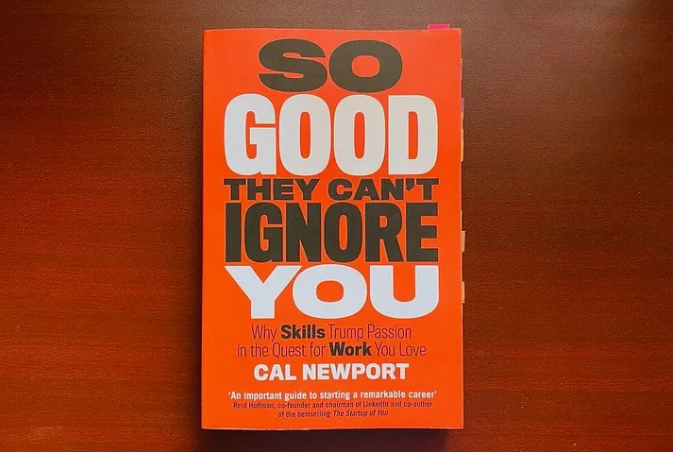The Author
Calvin “Cal” Newport is an associate professor of Computer Science at Georgetown University. Before that, he received a PhD in computer science at MIT. While being in academia, he writes nonfiction books exploring the intersection between technology, culture, and human productivity.
If you’ve been a fan of productivity books for the last few years, you may have come across some of his best-selling books including Deep Work, Digital Minimalism, and A World Without Email.
To be honest, I always knew Cal Newport as some productivity guru who wrote Deep Work. Last month, while training for the Powerman duathlon, I listened to Deep Work and was astonished at how much insight and takeaways I gathered from the book.
This time around, I picked up his older book, “So Good They Can’t Ignore You”, released in 2012, in audiobook format. Here are my thoughts and lessons learnt from the book.
The Idea
The book opens with the story of Thomas, a young philosophy and comparative religion graduate, who believes practising Zen is the key to a meaningful life. After graduation, Thomas taught English in South Korea and took data entry jobs with a bank.
However, he feels like he’s not serving his life purpose and quits to pursue his passion of becoming a Zen practitioner.
Thomas undergoes monk training in the Zen Mountain Monastery and successfully becomes a Zen practitioner after 1 year. He noticed although his surroundings have changed, he is still the same person with the same worries and anxieties.
This made Cal ask, “How do people end up loving what they do?”
Along his journey to discover this question, he came to the premise of this book:
“The things that make a great job great, I discovered, are rare and valuable. If you want them in your working life, you need something rare and valuable to offer in return…you need to be good at something before you can expect a good job.”
This book debunks the saying of “follow your passion” which Cal simply termed as the Passion Hypothesis. Cal argues Passion Hypothesis is flawed and passion is the result of mastering rare and valuable skills in your industry, becoming so good that they can’t ignore you.
Instead of finding the “right work”, focus on “working right”.
I found the whole concept very appealing as I always wonder: How can someone have a predetermined passion buried deep within themselves waiting to be discovered, especially if they haven’t tried it before? It just doesn’t make sense.
For me, focusing on “working right” is an active role that I can adopt right here and now, rather than finding the “right work”, which is more defensive and vague, since there are thousands of possible jobs that you can try.
The Book
Cal Newport is a master writer. In this book, he introduces a concept, and then reinforces it through real-world examples from programmers, to guitarists and screenwriters, making it reliable across different fields.
By building rare and valuable skills within our jobs, we accumulate expertise in what Cal termed as “career capital”. This capital is built through adopting the craftsman mindset and deliberate practice.
He uses the stand-up comedian, Steve Martin and guitarist, Jordan Tice as examples.
However, not all jobs are worth pursuing and Cal outlines three disqualifying traits of a job that is not worth pursuing to build your career capital. They are:
- Jobs with limited opportunity to distinguish yourself by developing valuable skills.
- Jobs that focus on something that you think is useless and not good for the world.
- Jobs that force you to work with people you dislike.
If a job has a combination of these traits, it can hinder your attempt to build career capital.
Career capital is important as it can be leveraged to gain more control over our time, money, and creativity.
This control of creativity, time, and money eventually brings passion to our job and we can focus on finding the big mission in life.
Cal also includes on how he implements these new habits in his daily work.
The book closes with the continuation of the story of Thomas, who returns to the same bank after his Zen practices.
Instead of focusing on trying to discover his passion, Thomas looks forward to performing his tasks well. Within two years, he received three promotions and was entrusted with handling systems that managed over six billion dollars of investment assets.
He is far happier in his current job due to the creativity and control that he gained from his accumulated career capital.
My Takeaways
- Passion is not something that lies dormant within ourselves, waiting to be discovered. Instead, passion is flexible and can grow along in our pursuit of perfecting our craft.
- Continuously improve our crafts by adopting the craftsman mindset and performing deliberate practice.
- As an aspiring writer, my deliberate practice will be dissecting articles and writings from my favourite writers, and learning how they structure and phrase their work. Additionally, I will produce my writing and share it with the world to receive feedback.
- With career capital, I can determine with whom I would like to work and set my own style and work schedule.
Conclusion
“So Good They Can’t Ignore You” is a refreshing read that debunks the popular “follow your passion” advice. Instead, the book focuses on empowering readers through the concept of “working right.”
I think this book has a timeless quality and deserves to be revisited every few years just to keep you reminded and the ideas fresh in your minds.
Cal Newport’s insights such as adopting a craftsman mindset in developing rare and valuable skills are highly actionable.
In conclusion, a must-read for anyone looking to switch careers or begin working.



